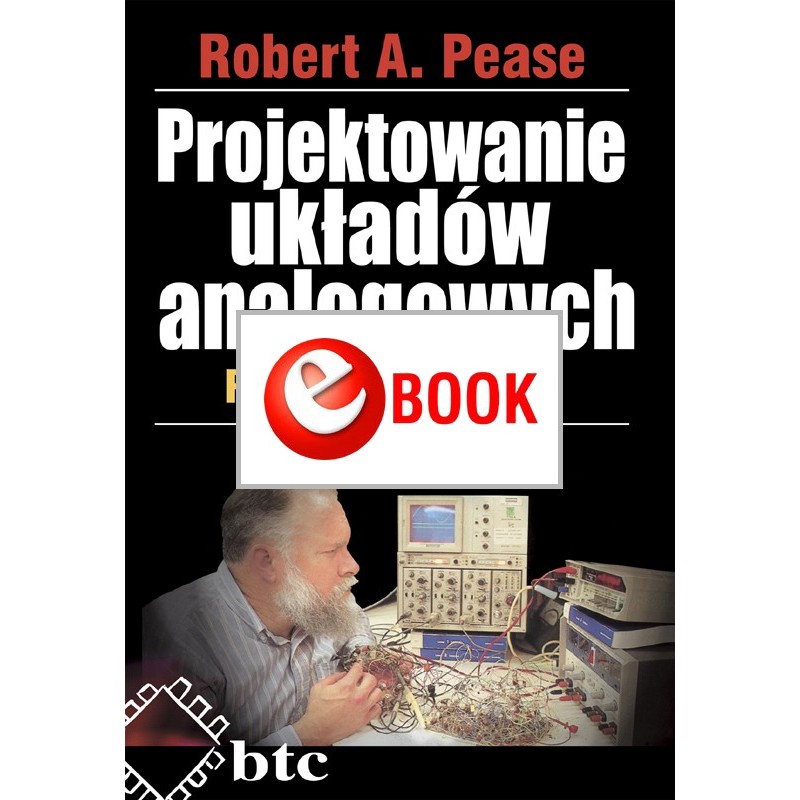

Author: Robert A. Pease
Original title: Troubleshooting Analog Circuits
Translation: Mieczysław Kręciejewski
ISBN: 83-60233-04-7
Format: PDF, B5, 270 pages
BTC publishing house
Warsaw - paper edition 2005
A book as unique as its author. It is a unique guide to the secrets of designing analog circuits, written in accordance with the spirit of an experienced practitioner, whose primary goal is to understand why something does not work as it should.
Excerpts from the book: "(...) Why are we interested in removing faults? Because even the best engineers undertake projects that are so difficult and so challenging that the systems developed often do not work as they should - at least not immediately (...) "
"(...) There is a good chance that Murphy's law will attack even our best projects, but I can make Murphy's law work for me: 'If something goes wrong, it's definitely not For example, if I drive a car with a fire extinguisher, if I am prepared to extinguish any fire, will it - in accordance with Murphy's law - protect me from a fire in the car? This is the first time I hear it sounds silly. I am a type of meticulous person moving with a fire extinguisher, I can also be careful and not perform stupid things that could cause a fire (...) "
They wrote about the book:
"Bob's style not only reflects his sense of humor, but also shows his eccentric and sometimes weird character, but his perfectionism and excellent craftsmanship are clearly visible, and I would like to emphasize that if we were to process Bob's materials according to our cliché, they would lose a significant part of their value Among the reasons for Bob's success, he must be mentioned who he is and what his approach to problems is, there was no better way to portray Bob's readers than his own style. "
Dan Strassberg
Associate Editor
EDN Magazine
"As you might expect, Bob meets us with much more than just his impressive qualifications." One of Bob's hobbies is to walk along the paths of a human foot, to see where they are leading, traveling on foot, on skis or on a bike - sometimes alone and sometimes with his wife and two sons - often along abandoned railroad embankments crossing the United States and England, beyond the calmness, excitement and excitement of travel alone, the prize for such a journey is America's observation from the perspective of only a few people known. It is evident in many of his other activities - either work-related or not-National uses Bob's passion for communicating ideas that others may use, in addition to the design of integrated sources of reference voltages, voltage stabilizers, temperature sensors, Bob's senior research worker eratura and VFC - deals with providing consultations to colleagues, responses to customer questions that other engineers do not know and can view colleagues' projects. Bob is also a long-time editor cooperating with EDN, assessing the ideas sent by the readers in the field of analogue technology.
Alan McCann, EDN
Robert A. Pease (1940 - 2011) was a graduate of the famous MIT (Massachusetts Institute of Technology graduated in 1961), one of the largest contemporary legends of analog electronics. At National Semiconductor, he was involved in designing integrated circuits for over 30 years, in which he collaborated with many celebrities, including Robert Widlarem, creator of the first integrated operational amplifier. He held seminars and training around the world, during which he taught designers how to avoid mistakes when designing electronic devices. He published a lot (including in Electronic Design News), he also shared knowledge with employees of the National Semiconductor technical support department.
Manufacturer BTC Korporacja sp. z o. o. Lwowska 5 05-120 Legionowo Poland sprzedaz@kamami.pl 22 767 36 20
Responsible person BTC Korporacja sp. z o. o. Lwowska 5 05-120 Legionowo Poland sprzedaz@kamami.pl 22 767 36 20
H. Kreidl, G. Kupris, P. Dilger
Charles Kitchin, Lew Counts
Jarosław Doliński
Robert Brzoza-Woch

Robert A. Pease
